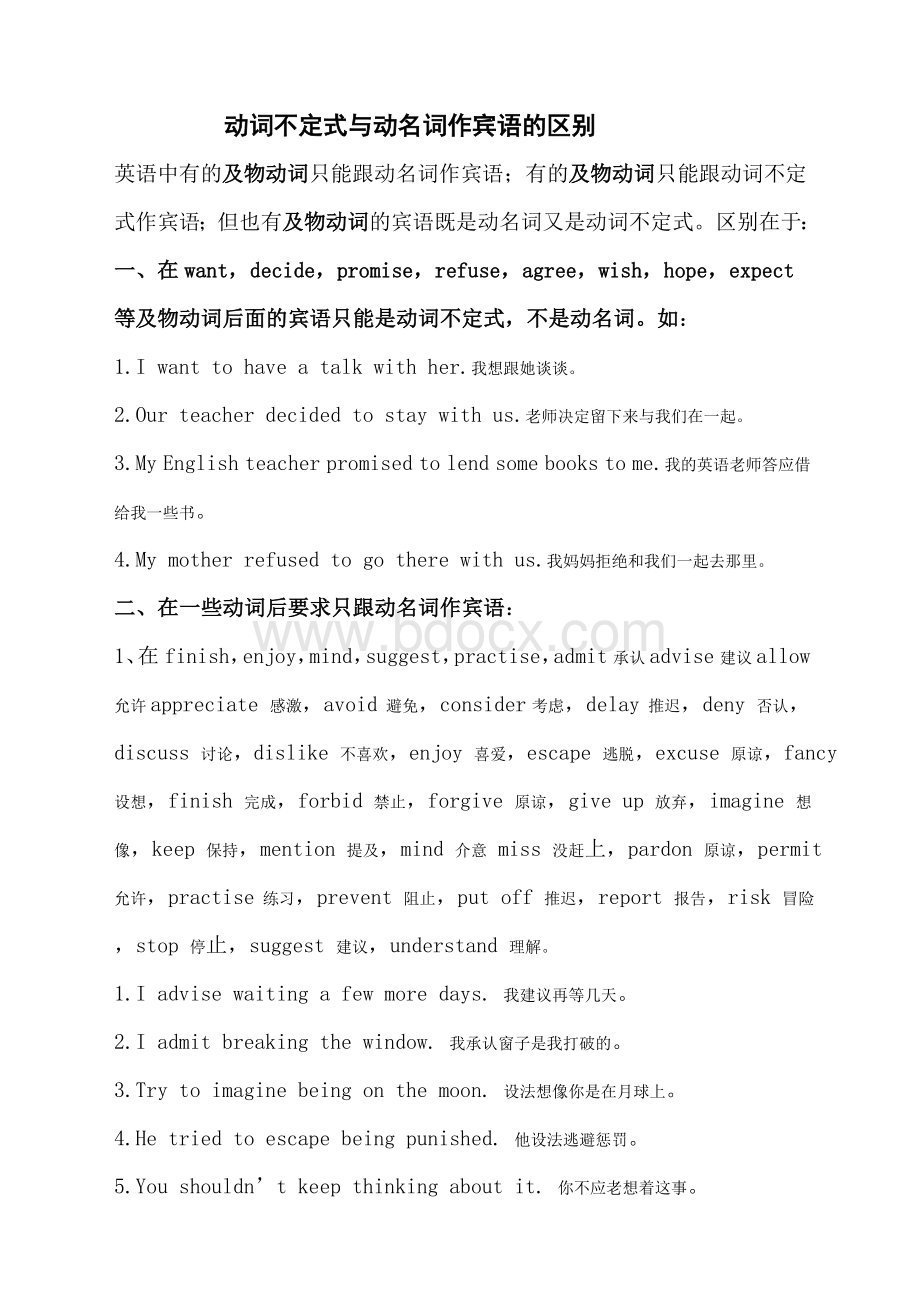动词不定式与动名词作宾语的区别.doc
《动词不定式与动名词作宾语的区别.doc》由会员分享,可在线阅读,更多相关《动词不定式与动名词作宾语的区别.doc(11页珍藏版)》请在冰豆网上搜索。

动词不定式与动名词作宾语的区别
英语中有的及物动词只能跟动名词作宾语;有的及物动词只能跟动词不定式作宾语;但也有及物动词的宾语既是动名词又是动词不定式。
区别在于:
一、在want,decide,promise,refuse,agree,wish,hope,expect等及物动词后面的宾语只能是动词不定式,不是动名词。
如:
1.Iwanttohaveatalkwithher.我想跟她谈谈。
2.Ourteacherdecidedtostaywithus.老师决定留下来与我们在一起。
3.MyEnglishteacherpromisedtolendsomebookstome.我的英语老师答应借给我一些书。
4.Mymotherrefusedtogotherewithus.我妈妈拒绝和我们一起去那里。
二、在一些动词后要求只跟动名词作宾语:
1、在finish,enjoy,mind,suggest,practise,admit承认advise建议allow允许appreciate感激,avoid避免,consider考虑,delay推迟,deny否认,discuss讨论,dislike不喜欢,enjoy喜爱,escape逃脱,excuse原谅,fancy设想,finish完成,forbid禁止,forgive原谅,giveup放弃,imagine想像,keep保持,mention提及,mind介意miss没赶上,pardon原谅,permit允许,practise练习,prevent阻止,putoff推迟,report报告,risk冒险,stop停止,suggest建议,understand理解。
1.Iadvisewaitingafewmoredays.我建议再等几天。
2.Iadmitbreakingthewindow.我承认窗子是我打破的。
3.Trytoimaginebeingonthemoon.设法想像你是在月球上。
4.Hetriedtoescapebeingpunished.他设法逃避惩罚。
5.Youshouldn’tkeepthinkingaboutit.你不应老想着这事。
6.Wouldyoumindgoingwithher?
你可否同她一起去?
7.Ican’tunderstandneglectingchildrenlikethat.对孩子那样毫不经心,我不能理解。
8.Weonlymissedseeingeachotherbyfiveminutes.我们只因差五分钟而未能见面。
9.Wouldyoumindopeningthewindow?
打开窗好吗?
10.Thesebooksarewellworthreading.这些书值得读。
11.Mymothercouldn'thelpsmilingwhensheheardthegoodnews.听到那好消息,我妈妈情不自禁地笑起来。
12.Myfatherhasgivenupsmoking.我父亲戒烟了。
13.Everyoneinmyclassenjoysplayingfootball.我班人人喜欢踢足球。
14.Mikeoftenattemptstoescapebeingfinedwheneverhebreakstrafficregulations.
15.ThedoctorsuggestedthatIavoidsmokinganddrinkingforamonth.
16.Wouldyoumindopeningthewindow?
17.Themurdererdeniedkillingtherichman.
18.Iwouldappreciateyourkeepingitasecret.
2、有些短语动词和结构后面也要求跟动名词作宾语。
这样的短语动词常见的有:
insiston,beworth,object/objectionto,putoff,keepon,insiston,leaveoff,lookforwardto,thinkof,can'thelp,be/getusedto,spend...in,can’tstand忍不住;feellike想,欲;giveup放弃;putoff推迟,can’thelp忍不住,goon等。
如:
1.Doyoufeellikegoingoutfordinnerwithmetonight?
2.Chinesepeoplearelookingforwardtoholdingthe27thOlympicgames.
3.Iamusedtogoingtobedlateandgettinguplate.
4.Althoughpunctualhimself,theprofessorwasquiteused tostudents'beinglateforhislecture.
5.Ihavenoobjection_tohearingyourstoryagain.
6.Heputoffmakingadecisiontillhehadmoreinformation.在获得详情之前,他没有急于作出决定。
7.Doyoufeelliketakingawalk?
你要不要去散步?
8.WearelookingforwardtocomingtoChina.我们期待着来中国。
9.Wesucceededingettingoverallthedifficulties.我们终于克服了所有的困难。
3、在一些特别的句子结构中要求使用动名词:
1.“haveproblem(+in)+动名词,
2.havefun(+in)+动名词,
3.havedifficultyindoingsth.,
4.havetrouble/ahardtimeindoingsth.;
5.bebusy(in)+动名词;
6.wastetime(in)+动名词;
losetime(in)+动名词;
以上动名词做介词宾语,in常要省去。
例如:
Thechildrenarebusydoingtheirhomework.。
孩子们忙于做作业。
4、在下列结构中动名词作主语。
“Thereis(was)no+doing”结构中作主语。
therebenoneed+动名词,
Thereisnopoint(in)+动名词”等结构中,
Thereisnopoint(in)makingthesimpleexperimentsonceagain.再做一次这种简单的实验是毫无意义的。
Thereisnodenyingthatsheisveryefficient. 她效率高是不容否认的。
5、当动名词做主语时,我们常用先行词it作形式主语,而把真正的主语动名词放到句尾,特别要注意如下结构:
1.Itisuseless(nouse,nogood,fun,noharm,awasteoftime,agoodpleasure)doing...
2.Itisawasteoftimedoing...
3.Itisworthwhiledoing...【例如】
Itisnousecryingoverspiltmilk.
Itisawasteoftimediscussingsuchmatterswithhim.
Itisnogoodleavingtoday'sworkfortomorrow.
6、动名词在demand,deserve,need,require,want等动词后面作宾语时,表示被动的意思。
【例如】
1.Myshoesneedmending.
2.Thefollowinglanguagepointsdeservementioning.
3.Thismatterdemandsdiscussing.
4.Yourhairwantscutting.
Itisnogoodwritingtohim;heneveranswersletters.写信给他不妥,他从来不回信。
Itisnouseyourcomplaining;thecompanywon’tdoanythingaboutit.抱怨是没有用的,公司是不会管的。
Itisgoodplayingchessaftersupper.晚饭后弈棋挺好。
Itisuselessspeaking.光说是没有用的。
三、在begin,start,like,hate,remember,forget等及物动词后,既可用动名词作宾语又可用动词不定式作宾语,但意义不同。
1、在like后用动名词作宾语,表示“习惯或爱好”,时间不明确。
其后接动词不定式作宾语,表示“喜欢要做的某一特定动作”,时间明确。
如:
1)Helikesplayingbasketball.她喜欢打篮球。
(爱好)
2)Wedon'tliketoplayfootballtoday.我们今天不想踢足球。
(指活动)
2、在like,hate后接动名词作宾语时,动名词这个动作的发出者,可能是句子的主语或者是指其他人。
如:
1)Myfriendlikessinging.我的朋友喜欢唱歌。
(可能自己喜欢唱,也可能喜欢别人唱)
2)Myfriendlikestosing.我朋友喜欢唱。
(自己唱)
3)Ihatetosmoke.我不喜欢吸烟。
(指自己不吸烟)
4)Mymotherhatessmoking.我母亲反对吸烟。
(自己不吸,也反对别人吸)
3在begin,start后接动名词作宾语,表示有意识地“开始”;接动词不定式表示无意识地“开始”。
如:
1)ShebegantostudyChineseaftershecametoChine.她来中国后就开始学汉语。
(并非主观意识)
2)HebeganteachinghimselfJapanesein2000.他自2000年开始自学日语。
(主观意识)
3)MyteachersstartedtravellingalongwayfromShanghaitoBeijing.老师们从上海至北京开始了长途旅行。
4)Itstartedtorainattenlastnight.昨晚十点开始下起雨来。
(没主观意识)
四、在部分动词后用动名词作宾语或不定式(不再是宾语)意思是不同的:
1、在stop、try、can’thelp、goon后面用动名词或todo不定式意思不一样。
在stop后面用动名词说明动名词所表示的动作终止;用动词不定式不再是宾语,是作目的状语,以表示动词不定式所表示动作的开始。
如:
1)Theystoppe